\ˈdiŋ-kəl\
I had no idea.
The first hint I had was Grimbert coming home after the first week of practice announcing he needed Dinkles and a shako.
“Say what?” I asked.
“Dinkles, mom. It’s a kind of shoe.”
“Oh. OK. And a … spork?”
(Eyeroll) “Not a spork, mom. A shako.”
Turns out competitive marching band is not just school fight songs and giant initials: it is more like a cross between a Busby Berkley spectacular and a marine landing. There are props! There is precision drill! There is a color guard dancing and waving flags and twirling rifles and sabers. (Sabers?!) There are hours and hours and hours of practice in the blazing sun and late into the night. There are drill books with indecipherable scrawls and grids and hash marks and squiggly arrows showing the triangle people moving HERE, while the square section moves THERE and the little circles weave in and out in between, and then all 150 kids end up in a perfect 10 x 15 grid thus opening a porthole to a new dimension. And they do this while marching backwards playing the 1812 Overture. Preferably with live cannon, if the band director could figure out a way to get them onto the field without damaging the artificial turf.
It’s all highly educational. Grimbert has gotten a lot out of it, and he seems to be having a pretty good time. I too have learned many things in my tenure as a Band Parent:
- I have learned how to load 150 instrument cases onto a trailer in under 15 minutes.
- I have learned how to make concession stand nachos on an industrial scale. (Start with five 7-pound cans of liquid cheese.)
- I have learned to avoid the band room when the kids are changing out of their uniforms. (Imagine, if you can, the smell of several hundred adolescents who have been wrapped in polyester and marching in the sun for 3 hours. I take it back. You cannot imagine this.)
- I have learned that when the kids put on their sporks (“Shakos, mom!”) with the feather plumes it changes the way they stand and move and makes it much more difficult to pick out one’s own kid from the crowd. It also makes them look like giant Q-tips.
- I have learned that nothing is sacred, musically speaking, when it comes to band music. Grimbert’s field show this year features the “Lacrimosa” movement from Mozart’s Requiem. Which they play while marching backwards, wearing Dinkles and shreks (“Mom!”) The first time I witnessed this, I laughed so hard I shot coffee out my nose. No one else in the bleachers seemed to think it was all that funny.
For those of you who do not read the comics (I hear newspapers are dead), Funky Winkerbean is a long-running strip that centers on staff and students at a high school in an unnamed small Midwestern city. It’s supposed to be one of the “comic” strips--at least the last panel often includes a joke of some kind--but since the mid-90s it has been taking on Serious Real Life Issues. The result is an unnerving mix of bad puns, cancer, snarky comments, alcoholism, PTSD, and crushed dreams. Characters age in real time, so you can use the career of your high school avatar as an index of your own decay. (Former editor of school paper hopes to land the anchor spot at a local news station. Whoops! Instead she gets laid off & replaced by a younger, sexier woman promoted from the weather desk! Hilarious! And then her husband leaves her! Ha ha ha!!)
At any rate Band Director Dinkle is supposed to be lovably obsessed with his apathetic and marginally talented band. Their anomie may be due to the fact that their team is called the Westview Scapegoats, or it may be because they always have to play in the rain. Dinkle dreams of brilliant shows, ablaze with fireworks and pageantry; his students trudge around the field, dent their instruments, and occasionally sneak off to sniff glue behind the gym or get each other pregnant. In recent years Dinkle has moved on to some kind of district management position, but he reappears periodically to offer advice to his successor (who is missing one arm because of a car accident caused by her drunk-driving high school boyfriend. What a riot!)
| I was fairly certain that Dinkles are cognate with Band Director Harry: the question was, were the shoes named for the character or the was character named for the shoe? I figured the latter, but it turns out I was wrong: the Savoca family, a Pennsylvania outfit that has made marching shoes since the 1940s, revamped their line in the mid-1980s and named their flagship product after Harry Dinkle, whose beaming mug now adorns every box. |
Actually the more I think about it, the more I realize that there is a certain melancholic sweetness to this whole Band Mom thing. Grimbert’s high school, like the one in FW, is named Westview. And while I devoutly hope Grimbert won’t be subjected to the full range of miseries that Batuik inflicts on his characters he will certainly grow older. He will struggle. He may be thwarted in love. He will probably lose his hair (sorry sweetie, but the genetic die seems to be cast on that one).
| But here on YouTube he will remain in Keatsian glory, a “happy melodist, unwearièd / For ever piping songs for ever new.” You’ll know him when you see him. He’s the one in the spork. | |

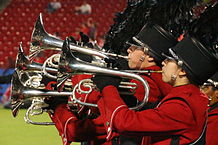
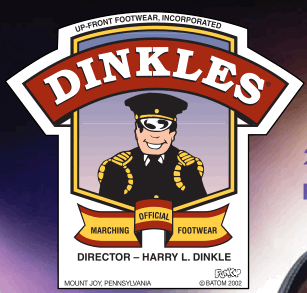
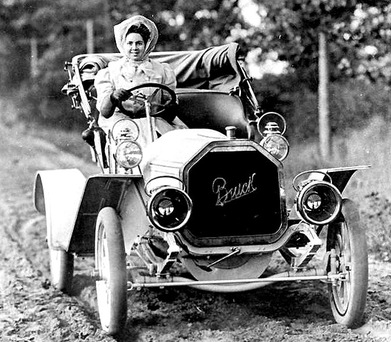



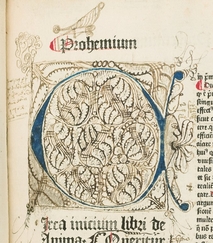
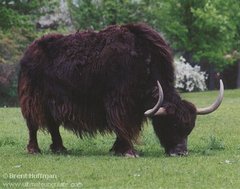
 RSS Feed
RSS Feed